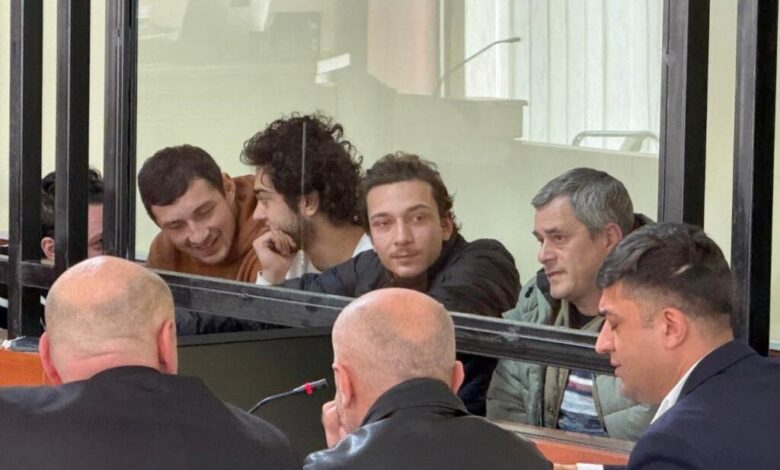
Batumi Protester Sentenced to Nine Months in Jail, Four Others Fined
Batumi City Court Judge Viktor Metreveli on July 25 found five individuals from Batumi State University of Arts, including Dean Mamuka Jorbenadze and four students, guilty of group violence over a December 2024 campus incident, sentencing one of them, Anri Kakabadze, to nine months in prison and fining the others.
Kakabadze, who has already spent seven months in pretrial detention, is expected to be released in two months. Prosecutors, who sought a prison sentence, cited his previous release on bail in a separate case.
Dean Jorbenadze was fined GEL 20,000 (about USD 7,400), later reduced to GEL 18,000 after two months in pretrial custody. The three students – Guram Mikeladze, Davit Gvianidze, and Giorgi Davitadze – got GEL 17,000 (about USD 6,300) fines each, reduced to GEL 15,000 (about USD 5,500).
The case stems from a December 3, 2024, incident at Batumi State University of Arts, where, according to the prosecution, the convicted individuals assaulted in a group Irakli Devadze, who is a senior official at Batumi City Hall and husband of University of Arts lecturer Tea Tsaguria, along with his companion, Irakli Nakashidze. The incident followed an earlier verbal dispute between Tea Tsaguria and Dean Mamuka Jorbenadze over a protest banner hung near the rector’s office.
The five were detained on December 9, with four of them, all except Anri Kakabadze, released on bail of GEL 5,000 (about USD 1,840) on January 28, after prosecutors requested bail instead of continued pretrial detention.
Batumi University of Arts was one of the epicenters of pro-European protests following the Georgian Dream government’s November 28, 2024, decision to halt Georgia’s EU accession.
In a separate case, on January 21, 2025, Georgian Dream member Tite Aroshidze was elected rector of Batumi Shota Rustaveli State University, despite vocal opposition from students. Protesters claimed the appointment was part of a broader effort by the ruling party to exert political influence over academic institutions and suppress student activism.
Also Read:
- 18/07/2025 – Protester Anri Kvaratskhelia Sentenced to 4.5 Years in Jail Over Molotov Cocktail Allegations
- 31/05/2025 – Court Sends Students to 12-Day Detention for Allegedly Insulting MP
- 14/03/2025 – Theater and Film University Rector Reverses Decision to Suspend Protesting Students
- 10/03/2025 – University Suspends Protesting Students, Watchdog Speaks Out About GD’s Suppression of Student Protest
This post is also available in: ქართული